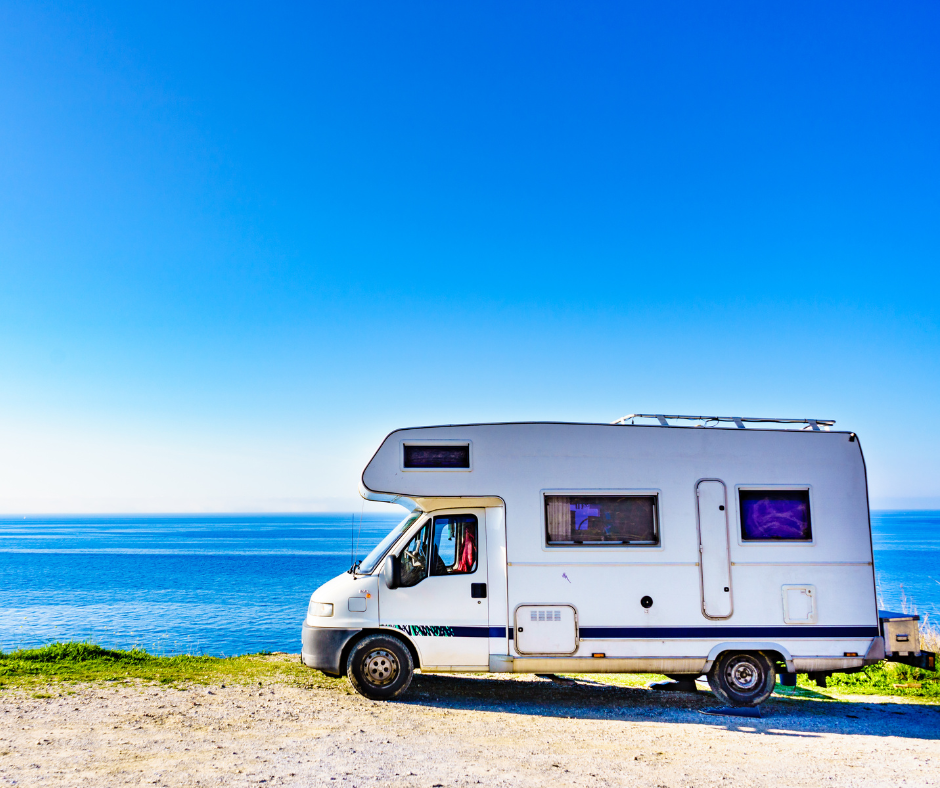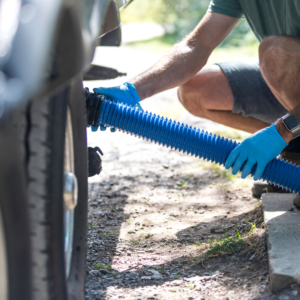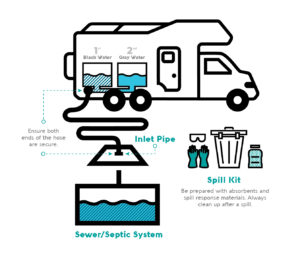RV Dump Station Tips for a Summer Of Exploring
April 27, 2023

Summer is almost here! Are you planning to explore OC in an RV with your family this summer? We’ve got you covered.
RVs can be tremendous family assets and a more affordable option for travel, but they can also be a source of pollution if you aren’t careful. Black and gray water in RVs includes soaps, food waste, bacteria, and sewage.
Follow the tips in this blog post to keep our waterways healthy during RV road trips and prevent an environmentally harmful and smelly RV dump station experience.
RV Potential Pollutants
Unlike the sewer system, which does treat wastewater, anything that flows into the storm drain system is NOT treated. If dump station best practices are not followed, spills can occur causing bacteria and human waste to flow untreated into our creeks, rivers, and ocean. This can lead to animal and plant life dying, swimmers and surfers getting sick, and our water quality deteriorating.
Preventing harmful RV spills is critical for keeping our community healthy and waterways flourishing.

Man carefully draining black water tank at RV dump station.
RV Dump Station Best Practices
Now that we know how harmful RV black and gray water can be, it is time to learn about dump station best practices to keep bacteria and waste out of our waterways.
When emptying your RV’s holding tanks:
- Ensure both ends of the dump hose are secure before you open the tank valve.
- Dump your black water tank before the gray water tank.
- Pay attention to the hose while dumping to ensure it remains connected and is properly draining.
- While still connected to the inlet pipe, disconnect the RV end of the hose and rinse the inside of the hose to remove any residue.
- Keep the valves shut while the tanks aren’t being drained to allow for the proper buildup needed to thoroughly drain your tank.
Following these best practices can significantly reduce your chance of a harmful spill.

RV tanks, sewer/septic system, and spill kit.
Tips for Cleaning Spills
It’s critical to take the necessary steps above to prevent spills. However, what happens if a spill occurs? Breathe. Try not to panic. And follow these tips:
- Always keep a spill kit on hand. Your spill kit should be stocked with absorbent, gloves, safety glasses, and a receptacle to use if necessary.
- Put on personal protective equipment (PPE) like gloves and safety glasses.
- Clean up spills and residue using dry methods. Wet methods can cause waste to flow untreated into the storm drain.
- Use absorbents to soak up and contain the waste.
- Sweep up and properly dispose of waste in a closed bin.
Being prepared when dealing with human waste can help prevent an unpleasant situation and keep our creeks, rivers, and ocean thriving.
Find an RV Dump Station Near You
While on your road trip, it’s important to know where the closest RV dump stations are near you. Planning ahead can keep your trip seamless and enjoyable. Find an RV dump station near you by searching “RV dump stations near me” or “RV dump stations Orange County” in your preferred search engine. Based on where you go, some stations are cash-only, card-only, or both, so make sure you look up the accepted payment methods and hours of operation before you go.
All of us are responsible for protecting our waterways. To learn more about using RV dump stations, visit our RV Dumping Guide. For more RV tips, read our RVing in Beautiful Orange County Pamphlet.
By following the best practices in this blog, you can prevent harmful black and gray water from flowing into our waterways and damaging our environment. Thank you for keeping our water bodies safe while exploring beautiful Orange County!